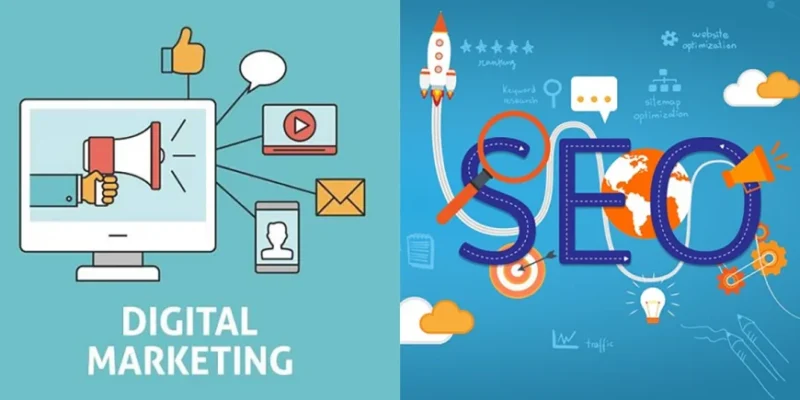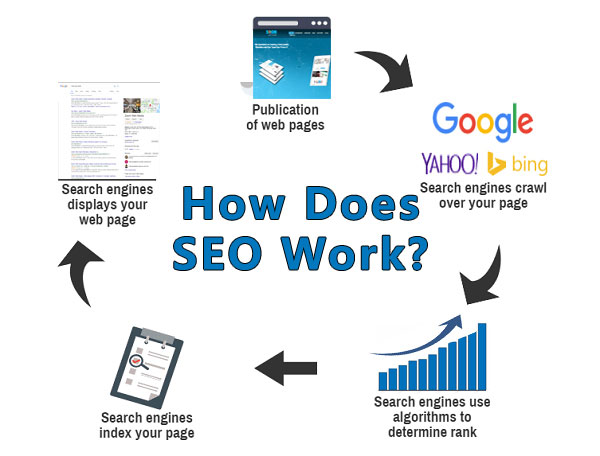
What is SEO in Digital Marketing and how does it work?
Before we directly jump to SEO in digital marketing, let’s first understand SEO and Digital Marketing
Search engine optimization, or SEO. It essentially means making your website (or blog) visible in search results so that people can find you and read what you have to say. To spread the word about your business and turn prospective customers into paying customers, all you have to do is use the online resources at your disposal. Consider this: if a user searches on Google’s first page and your website isn’t listed at the top, you haven’t succeeded in attracting visitors. In short, SEO gives your company a chance to be seen by customers and generate more revenue.
Even beginners can quickly learn the basics. According to Forbes, WordPress has a shorter learning curve compared to platforms like Drupal or Shopify, making it a smart choice for content creation and management.

The process of SEO involves several steps:
It will start by looking for vulnerabilities on your website. These flaws could be anything from a missing page title to an outdated layout that improperly displays video or images.
It will then come up with plans to enhance the usability and experience of your website.
It will start by looking for vulnerabilities on your website. These flaws could be anything from a missing page title to an outdated layout that improperly displays video or images.
It will then come up with plans to enhance the usability and experience of your website.
Finally, tests will be conducted to track search engine rankings and penalize websites that are not properly optimized. Making your website more visible to search engines through pertinent search terms is the essence of SEO. Your chances of being found by the right people increase as your website becomes more search engine friendly.
Even beginners can quickly learn the basics. According to Forbes, WordPress has a shorter learning curve compared to platforms like Drupal or Shopify, making it a smart choice for content creation and management.
Introduction to Digital Marketing
In its broadest sense, digital marketing refers to strategies used to advertise and market goods and services online. No matter how they have advertised their products elsewhere, small businesses now use social media and blogging platforms to connect with customers.
The ability to succeed in digital marketing requires a thorough understanding of the various internet platforms as well as specialized skills. Customer engagement is the main focus of an effective digital marketing campaign, which adheres to the 1995 standards of involving customers for information, suggestions, calls to action, and other opportunities to increase brand awareness, change attitudes and behavior, and foster loyalty. These standards include defining the customer as the person using the service or product, the nature of the relationship between the customer and the business, and the significance of location in the decision-making process for decisions made at particular locations.
What is SEO in Digital Marketing?
An extensive subject, SEO. Although it only covers one business topic, it also covers a wide range of related issues. With numerous references and definitions scattered throughout the various entries, it resembles a miniature encyclopedia. The best digital marketing strategy combines a variety of tactics. Through search engine optimization (SEO), you want to attract as many visitors (backlinks) and potential customers to your website as you can. Combining analytics, marketing, and content creation results in the best SEO strategy. These topics are all significant in their own right. Analytics makes it possible to determine which links are effective and which are not. You can generate leads, improve your content, and create and promote the right connections with the help of advertising. The way you turn your blog or website into a real business is through content creation.
The ability to succeed in digital marketing requires a thorough understanding of the various internet platforms as well as specialized skills. Customer engagement is the main focus of an effective digital marketing campaign, which adheres to the 1995 standards of involving customers for information, suggestions, calls to action, and other opportunities to increase brand awareness, change attitudes and behavior, and foster loyalty. These standards include defining the customer as the person using the service or product, the nature of the relationship between the customer and the business, and the significance of location in the decision-making process for decisions made at particular locations.
Components of SEO in Digital Marketing
Key Words:
The most important component of your SEO strategy is keywords. When a potential customer searches for a term on Google, the search engine looks it up using data from another website (if there is a lot of competition for a particular term, the SERP page will be crowded with listings for other sites). Your chances of ranking highly for a given term increase with the precision and specificity of your keywords. Generally speaking, the less specific your links (in blog posts) are, the less likely it is that anyone will click on them. The selection of a keyword is crucial for several reasons. First of all, your site won’t rank highly for those keywords if you don’t choose the appropriate keywords. Second, even if you choose the ideal keywords, your website can still fall in the rankings if it isn’t properly optimized for them.
Content:
The purpose of content in SEO is to give search engines something of value, interest, and relevance. Simply put, content aims to provide information that is useful to readers and draws them to the site. Similar to the search query “which song is good” or “what movie do you want me to watch?,” the crucial question is “What topic can I rank for?” The response will vary greatly depending on the type of content. In order to differentiate your content from that of rivals, it must contain relevant and interesting content.
Backlinks:
When it comes to SEO, backlinks are crucial. A backlink is essentially a small piece of code that is posted on websites and points to another website. When your website receives a lot of backlinks, it means that other websites have read and paid attention to what you have to say. In the event that the page has low-quality content, even if there are many links pointing to it and it receives a lot of traffic, your SEO will not benefit greatly. You must learn how to rank high-quality content alongside low-quality content so that visitors from both high-quality websites can find the information they need.
Social media:
Nowadays, SEO cannot exist without social media. In order to promote search engine results pages (SERPs), websites like Facebook, Twitter, and Instagram have become crucial. Your content will be seen more often the more social media followers you have. By doing this, you raise the possibility that someone looking for a particular piece of information will discover it on your Facebook page, for instance. The same is true of other platforms like YouTube and Pinterest; before writing an article or making a video about them, make sure they are thoroughly covered.
The ability to succeed in digital marketing requires a thorough understanding of the various internet platforms as well as specialized skills. Customer engagement is the main focus of an effective digital marketing campaign, which adheres to the 1995 standards of involving customers for information, suggestions, calls to action, and other opportunities to increase brand awareness, change attitudes and behavior, and foster loyalty. These standards include defining the customer as the person using the service or product, the nature of the relationship between the customer and the business, and the significance of location in the decision-making process for decisions made at particular locations.
Importance of SEO in Digital Marketing
A number of factors make SEO crucial. For starters, it improves the user experience for every person who visits a website. People are more likely to buy products when they have more options for where to purchase them. As a result, consumers are more likely to select brands they enjoy and find interesting, which boosts sales for everyone. Secondly, a well-informed community makes wiser choices. Making wise purchasing decisions is more likely when people are able to see a situation from all angles. One of the most important elements of any effective digital marketing campaign is search engine optimization (SEO). Users of the search engine are able to post messages, read and comment on other people’s content, and find and read web pages. If your content persuades readers, they will stay on it longer, which increases revenue from affiliate marketing and ads. Nevertheless, even for small blogs, ranking on the first page of Google is no easy task. Your website may lack crucial features and components even if you have the best SEO skills, which could prevent it from getting the exposure it needs to succeed.
The ability to succeed in digital marketing requires a thorough understanding of the various internet platforms as well as specialized skills. Customer engagement is the main focus of an effective digital marketing campaign, which adheres to the 1995 standards of involving customers for information, suggestions, calls to action, and other opportunities to increase brand awareness, change attitudes and behavior, and foster loyalty. These standards include defining the customer as the person using the service or product, the nature of the relationship between the customer and the business, and the significance of location in the decision-making process for decisions made at particular locations.
Conclusion:
In conclusion, SEO is the lifeblood of internet marketing, and without it, digital marketing fails. It is entirely focused on boosting your website’s search engine ranking position and drawing more user attention to it, both of which will inevitably increase your company’s revenue.
Master SEO for Digital Marketing Success
Unlock the full potential of your website with effective SEO strategies. Learn how to optimize content, target the right keywords, build quality backlinks, and leverage social media to boost your visibility. SEO is the cornerstone of digital marketing, driving traffic, engagement, and revenue for your business.

